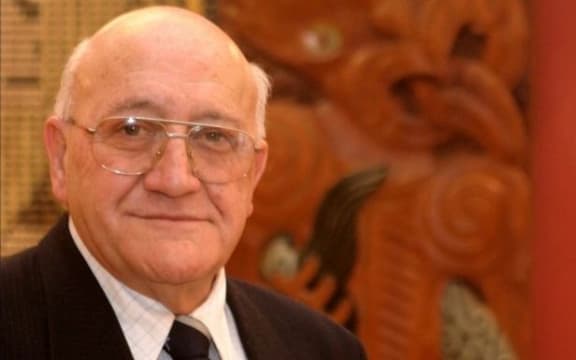A Ngāi Tahu academic has challenged Māoridom's educational and tribal leaders to make way for a new generation of rangatira.

Sir Tipene O'Regan Photo: Supplied
Sir Tipene O'Regan made the comment at the book launch of the Manu Ao Academy's, Fire that Kindles Hearts: 10 Māori Scholars, which profiles 10 respected Māori academics.
The book's been launched to celebrate the 10th anniversary of Te Kāhui Amokura, a group that promotes Māori interests at New Zealand's eight universities
One of those 10, Sir Mason Durie, of Rangitāne descent, said readers would get a better appreciation of what motivated the academics to enter their field of interest.
"They'll get an idea of the range of skills that have been aquired during their time at university," he said.
"These are 10 authors but are all doing quite different things which is important because I think Māori in the future will need to be spread out across a whole range of endeavours, not just in one area.
"And I think the third thing is how they use their academic work to achieve in a range of other areas leading into Māori development."
But Tā Tipene O'Regan from Ngāi Tahu, one of the guest speakers at the book launch, called for senior Māori leaders to allow aspiring rangatira to move into their positions.
He said he was at a recent hui at Rapaki Marae where he was impressed with the 30 and 40-year-old speakers but, none of them had leadership roles.
Tā Tipene said his generation took on those responsibilities in their 30s but have stayed put.
He said Māori leaders suffered from what he described as a "comfortable incumbency".
"I had a great feeling of satisfaction until I realised that not one of them had a place anywhere in Māoridom's representative institutions," he said.
"Because my generation had got into the representative positions and they weren't going anywhere.
"We're starting to look like the United States Senate."

From left, Māori Development Minister Te Ururoa Flavell, Te Kāhui Amokura chair Lynda Smith, Massey Professor Emeritus Sir Mason Durie, Universities NZ chair Harlene Hayne and New Zealand Chancellors Committee chairman John Ward. Photo: Supplied: Te Pokai Tara, Universities New Zealand
Te Pokai Tara, Universities New Zealand, chair Harlene Hayne said she had noticed during the two decades she had lived in Aotearoa how the eight universities have come to really value Māori culture.
"During that period of time I've watched an amazing cultural revolution within the universities where I think that many Māori felt that a university environment was quite a foreign land for them," Ms Hayne said.
"But, the universities have taken on board a huge amount of Māori culture and their aspirations and their world view, so that now these things are intricately woven into the fabric of all eight universities.
"So it's a place where Māori not only feel more comfortable, but it's also had a hugely enriching affect on everyone else as well."
Ms Hayne said Māori academics played an important part in advising government on important polices.
She said compared to other universities around the world, New Zealand is leading the way in terms of indigenous education and scholarship which is reflected in the book.


